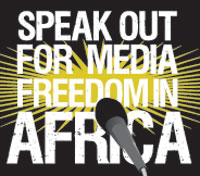Senegal: Walfadjri media group hounded prior to elections

Harassment of the Walfadjri media group has intensified in the past month or so. Four journalists with the daily Walfadjri l'Aurore were summoned to the Department of Criminal Investigations (DIC) on 13 July over a long article critical of the president's aides. One of its correspondents was threatened by a policeman on 26 June over his coverage of anti-government demonstrations. And two journalists with the daily Walf Grand-Place were convicted of libel on 14 June, shortly after the government accused the Walfadjri group of inciting an uprising and civil disobedience.
Authorities targeting the Walfadjri group
"We are disturbed to see the authorities targeting the Walfadjri group and the media in general just seven months before a presidential election and amid a month-old wave of serious anti-government protests, but we are not surprised," Reporters Without Borders said.
"President Wade and his government have long been showing a lack of good faith towards the media by, for example, pledging to decriminalise media offences and then not making good on their promises. We fear that the authorities will take advantage of the current, potentially destabilising climate to silence critical journalists, especially as a proposal by the broadcasting regulatory authority could open the way to large-scale censorship."
The four Walfadjri l'Aurore journalists who were summoned to the DIC on 13 July were former publisher Abdourahmane Camara and reporters Charles Gaïky Diène, Yakhya Massaly and Mohamed Mboyo, who had all signed a front-page article the previous day headlined, "Liars, aggressors and embezzlers - the Republic's hoodlums."
They were interrogated for more than 10 hours about the article, which contained allegations against nine of the president's aides, including current ministers. They were finally released in the absence of a main author, although Walfadjri group CEO Sidi Lamine Niasse declared himself to be the current publisher and as such responsible for the article.
Two weeks before that, on 26 June, the Walfajdri group's correspondent in Mbacké (190 km east of Dakar), El Modou Guève, was roughed up by Boly Gaye, a police officer critical of his coverage of demonstrations three days earlier against the president's plan to amend the constitution.
Censoring the media
Finally, after several postponements, a Dakar court passed a one-month suspended prison sentence on 14 June on Walf Grand-Place editor Jean Meissa Diop and reporter Ndiogou Cissé in a criminal libel action brought by Farba Senghor, the president's propaganda chief and former agricultural minister, over a front-page article by Cissé in the newspaper on 14 January about alleged embezzlement by Senghor. As the newspaper's owner, the Walfadjri group was ordered to pay 3 million CFA francs (€4,573) in damages.
Amid all the unrest, the National Council for Broadcasting Regulation (CNRA) has drafted a bill which, by amending articles 1, 4 and 26 of the January 2006 law creating the CNRA, would enable it to censor radio and TV stations. Although opposed by communication minister and government spokesman Moustapha Guirassy, the CNRA said it wanted additional powers in order to put an immediate stop to "abuses, excesses and violations by certain media."
Under the amended version of article 26, the CNRA would be able to order a radio or TV station to stop broadcasting immediately and would be able to impose sanctions "ranging from suspension of all of part of its programmes to the complete withdrawal of its broadcasting permit, and including financial sanctions ranging from a fine of 2 to 10 million francs or a daily penalty of 100,000 francs for failure to comply with a CNRA decision."
A decision on the proposed bill has been temporarily shelved. Senegal is ranked 93rd out of 178 countries in the 2010 Reporters Without Borders press freedom index.






